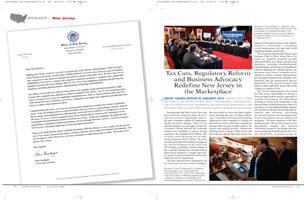
Since taking office in January 2010, Governor Chris Christie has chosen a new direction for New Jersey – lowering taxes, reducing bureaucracy that stifles economic development, and restructuring government so that the Garden State is a place where business growth is fostered and encouraged.
 |
| Governor Chris Christie, Lt. Governor Kim Guadagno and Fox News' Neil Cavuto hold a business roundtable discussion with business leaders from across the state at Rutgers Business School in Newark, N.J. in February 2011. |
Recognizing that New Jersey has long been viewed as a high tax state, the Governor has worked to significantly improve the state’s business climate by implementing key tax policy changes. After 115 tax and fee increases over an eight year period, Governor Christie allowed the corporate business tax surcharge to sunset, saving employers an estimated $90 million. The Governor vetoed an income tax rate hike, saving taxpayers $637 million. He more recently provided $180 million in targeted tax cuts for businesses in the fiscal year 2012 budget, including a critical change in the corporate business tax formula from a three-factor method to a single sales factor, and a 25-percent reduction in the minimum tax for S-Corporations.
The Red Tape Review Commission, led by Lieutenant Governor Kim Guadagno, has succeeded in removing dated regulations, fostering the use of online technology to streamline licensing and permitting applications, and continues to conduct an exhaustive review of the state’s regulatory process with one goal in mind: remove obstacles that impede growth. Businesses thinking about coming to New Jersey and those that are already here have more confidence in the state because of the Administration’s commitment to eliminating overly burdensome red tape and costly regulatory hurdles and hoops.
The Governor recently introduced a new Strategic Plan for New Jersey that is focused on: targeted economic growth, which will allow us to attract and grow key industries, including pharmaceuticals, manufacturing, technology and healthcare; effective planning for vibrant regions, emphasizing center-based, sustainable development to utilize existing infrastructure, prevent sprawl and promote walkable communities; and, the preservation and enhancement of the critical resources that helped Forbes rank New Jersey fifth in the country for quality of life.
 |
| Governor Chris Christie and Lt. Governor Kim Guadagno tour Honeywell with Chairman and CEO Dave Cote following a July 2010 press conference regarding the company's intention to redevelop their global headquarters and stay in Morris, N.J. |
The Christie Administration also created the New Jersey Partnership for Action, a three-pronged public-private approach to economic development. The Partnership is working to attract new businesses to the state and help existing businesses thrive by zeroing in on relationship-building and person-to-person outreach, promoting state incentives and resources, developing pro-growth policies, and assisting businesses in navigating state government and programs. The three elements of the Partnership include Choose New Jersey, an independently funded and operated corporation created to encourage and nurture economic growth throughout New Jersey. Choose NJ is helping to promote the Garden State as a world-class leader in the competitive global marketplace by effectively leveraging New Jersey’s diverse resource base and its reputation for innovation. Reporting directly to the Lieutenant Governor, the Business Action Center provides the business community with a single point of contact, applying a proactive and customer-service approach to businesses’ interactions with State government. Staff actively works to attract and retain businesses and interacts with various State agencies and departments to resolve problems with applications, business permits and regulatory issues. The final piece of the Partnership is the New Jersey Economic Development Authority (EDA), serving as the state’s “bank for business.”
Competitive Business Incentives
Governor Christie provided an immediate economic boost to the State by advancing competitive business incentives that complement the tax and regulatory reform policies and further demonstrate that New Jersey is well-positioned for business expansion, economic growth and job creation.
Companies that have chosen to locate new facilities in New Jersey – from Archimedes Pharma to Allergan, Inc. – have taken advantage of the Business Employment Incentive Program (BEIP), which has proven to be a powerful tool to encourage businesses to grow in the state. Approved businesses receive annual cash grants for up to 10 years. Grant amounts are based on a percentage – up to 80 percent – of the state income taxes withheld from the employees who fill the newly created jobs. The enhanced Business Retention and Relocation Assistance Grant (BRRAG) has finally provided New Jersey with a meaningful incentive for retention by offering businesses corporation business tax credits. The program, which has been instrumental in retaining a host of companies, including Bayer HealthCare and Pinnacle Foods, now offers up to $2,250 per year for up to six years, per job retained in the state.
 |
| Lt. Governor Kim Guadagno joins with company executives and local officials to celebrate Schar USA's first U.S. manufacturing facility in Logan, N.J. |
Other companies, such as Panasonic Corporation, the Campbell Soup Company and Goya Foods, are utilizing the Urban Transit Hub Tax Credit program, an incentive that was designed to spur private capital investment by providing tax credits for businesses planning a large expansion or relocating to a designated transit hub located within one of nine New Jersey urban municipalities. Through the program, developers, property owners or tenants can apply for tax credits equal to up to 100-percent of their capital investment. The Economic Redevelopment and Growth (ERG) Program is another redevelopment tool that provides reimbursement incentive grants so developers can utilize new state and local incremental taxes generated from a project to fund the gap in the total project cost.
The New Jersey Advantage
New Jersey’s inherent advantages and significant assets bolster the state’s aggressive efforts to attract and support businesses from other regions, both foreign and domestic.
New Jersey’s rich history of scientific research and discovery has had a profound impact on our state, our nation and throughout the world. That tradition of innovation continues today. As life science and technology companies race to meet the demands of the marketplace, many companies are finding great success in New Jersey, including Genta Inc., Amicus Therapeutics and LifeCell Corporation. With over 1,700 life science establishments in the state, it is no surprise that several major biopharmaceutical companies also call New Jersey home – from Johnson & Johnson to Bristol-Myers Squibb.
These companies recognize that New Jersey boasts the highest concentration of professionals in science-related fields in the country. Further, the state was recently ranked fourth in the country for both efforts to succeed in the innovation economy and access to capital. Coupled with world class technology centers, an active incubator network and an integrated set of financing tools and resources through the state’s Edison Innovation Fund, New Jersey is poised to retain its reputation as the “Innovative State” well into the future.
 |
| Technology Centre of New Jersey campus in North Brunswick |
With its highly skilled workforce, access to major ports, and sophisticated warehousing and logistics assets, New Jersey has built a manufacturing powerhouse, particularly in the food industry. The New Jersey food system includes over 1,600 food and beverage processors, as well as over 50,000 firms in production agriculture, wholesale, retail, and restaurant foodservice. The state also is home to the U.S. headquarters of several multinational firms, including Unilever and Mars.
When Dr. Schär, Europe’s leading producer of gluten-free products, chose to establish its fist U.S. facility in Gloucester County, the company attributed its decision to the cluster of food manufacturing businesses in southern New Jersey and the concentration of people trained in food production. With over 600 food manufacturing companies located within a 50-mile radius of Gloucester County, southern New Jersey has quickly become a hub for production and distribution. Having just graduated from the unique Rutgers Food Incubation Center (FIC), which provides business and technology expertise to food and agribusiness companies, Dr. Schär also recognized the advantage of continuing to work with the FIC in the areas of R&D, market research and employee training.
 |
| Hoboken, New Jersey |
Interested? Contact Us
There’s a lot going on in New Jersey as the state continues to enhance its business climate, streamline its regulatory process and advance pro-business initiatives. To learn more about New Jersey’s expertise and incentives to attract and support business growth, call the Business Action Center at (866) 534-7789 or visit the State’s Business Portal at www.newjerseybusiness.gov.

